
In this article we will discuss the history, design, advantages, technique and modern Combatives application of the Push Dagger [PD].
HISTORYThe Push Dagger [PD], also known as the punch dagger, or, push dirk, has a long history, beginning in that cradle of knife design, the Indian subcontinent.
INDIAIt has been said that all blade shapes and design-profiles can be found in India. With their rich history of edged-weapon manufacture and use, going back thousands of years, just about every type of straight, curved, and radical blade was tried on the sub-continent.
One such design was the Katar. To quote from a history of weapons text:
The Katar, also known as the Bundi dagger, is one of the oldest and most characteristic of the Indian knife weapons. The peculiarity lies in the handle which is made up of two parallel bars connected by two, or more, cross pieces, one of which is at the end of the side bars and is fastened to the blade. The remainder forms the handle which is at right angle to the blade. The blades are always double-edged and are generally straight and with lengths from a few inches to about 3 feet.

The Katar was used by the Mahrattas, a clan of Hindu warriors. The Katar could be used as a stand-alone weapon, especially in the larger sizes, or, utilised in conjunction with the sword, in the same way that later European main-gauche daggers were used.
It has been speculated that the push dagger was used in various other cultures throughout history. I requested such information on a forum devoted to edged-weapon history, with no result. The TV series Rome showed a PD being used, but, since they got some other historical details wrong, we can’t rely on this as being accurate.
AMERICA
The next major development in the PD history came in America. Both the Mississippi area, and the Barbary Coast saw the dagger used by a colourful cast of gamblers, hustlers, hawkers, land-grabbers and even lawmen.

The popular image of the professional gambler was a character who would secrete a pair of aces up one sleeve, a derringer pistol up the other, and a Push-dagger in his boot. As we will see, this use by disreputable characters led to the current legal situation regarding the PD.
Many of the daggers produced during this time were very ornate, with Ivory handles and Damascus blades.
IN THE TRENCHESThe First World War is regarded as a time of military innovation, with aircraft, submarines, tanks and chemical warfare all being introduced. However, it was also a time when armies reverted to Medieval warfare.
Trench warfare became the arena for vicious and pitiless hand-to-hand combat, fought largely with contact weapons.
Trench raids were common, and to attack, or, defend a trench entailed fighting in a canalised environment. Trenches were constructed with doglegs and broken angles, to prevent an enemy soldier from being able to fire down the entire length of the trench. Negotiating these right-angle corners, as well as the entrances to dug-outs needed close-quarter weapons. The battle rifles, while being splendid general infantry weapons were too lengthy to manoeuvre in tight confines, especially with bayonet attached. The obvious solution was the handgun, but the British and French armies were still issuing the revolver, a weapon totally unsuited to warfare in the mud. Of course the Americans would introduce the Colt .45 auto pistol, and the terrific Winchester Mod 12, pump-action shotgun ["trench broom"] but that was later in the war. The solution, for the Allies was to acquire a plethora a close-contact weapons.
The soldiers adapted any handy item. Nails were hammered into shards of wood to form fearsome clubs. Bayonets and entrenching tools were fastidiously sharpened. The
clou Francais ["French nail"] was made from metal stakes used to support the hundreds of miles of barbed wire; cut to a handy length, point sharpened, with the curly end an ideal hand-grip.
 [Trench weapons in the Royal Armouries]
[Trench weapons in the Royal Armouries]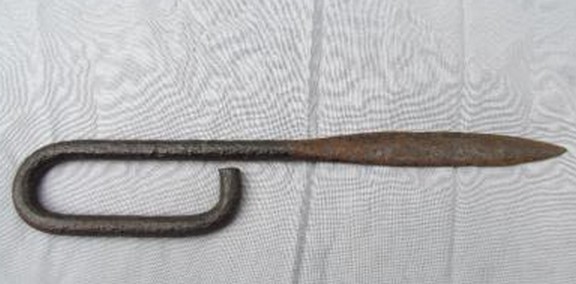 [French Nail weapon]
[French Nail weapon]Of course no officer from a decent regiment could go into battle wielding a crude club, so a range of bespoke weapons were developed by arms companies, for private purchase by young gentlemen.
One such company was Robbins of Dudley, a West Midlands ironmongery, who offered several specialised designs of knuckle-knives and Push Daggers.

I can easily envisage an officer leading his troops in a trench-clearing raid, brandishing his Webley in one hand, and his Robbins Push-dagger in the other, each weapon supporting the other.
PUSH DAGGER ADVANTAGES AND DISADVANTAGESLet’s examine the reasons why the PD may be a good choice for a self-protection knife, and also the case against.
SIMPLICITY:The primary attribute of the Push-dagger is simplicity of use. If you know how to punch, you know how to use the PD.

Many experts have noted that in order to rapidly incapacitate an enemy, the stab is superior to the slash, and the PD excels at stabbing.
We have found that the PD is an ideal weapon for WW-2 Combative Knife methods, some of which are detailed below.
ACCESSThe Push-dagger is simple to use, and it is equally simple to get into use. The draw-stroke with the PD is very natural, a simple grasping action seats the handle firmly in the hand, making draw-to-strike action very fast.
AMBIDEXTERITYThe Push-dagger is one of the easiest to use in the support-hand. Because of the natural grip of the fist, and the alignment of the wrist, access and strikes with the support side require much less training than most conventional edged weapon designs.
There is, actually, a case for setting up to use the PD in your offside hand, because it then makes your support-side extremely effective, while still having the normal degree of power and ability in your master hand. So, stabbing with the left, while grabbing, striking, controlling with the right, can be a canny option.
You can explore this main-gauche concept, by utilising the PD in the support-side hand, while using an impact weapon, firearm, or other blade in the master.
 [Push dagger plus baton]SUPPORT-SIDE ACCESS SEQUENCE
[Push dagger plus baton]SUPPORT-SIDE ACCESS SEQUENCE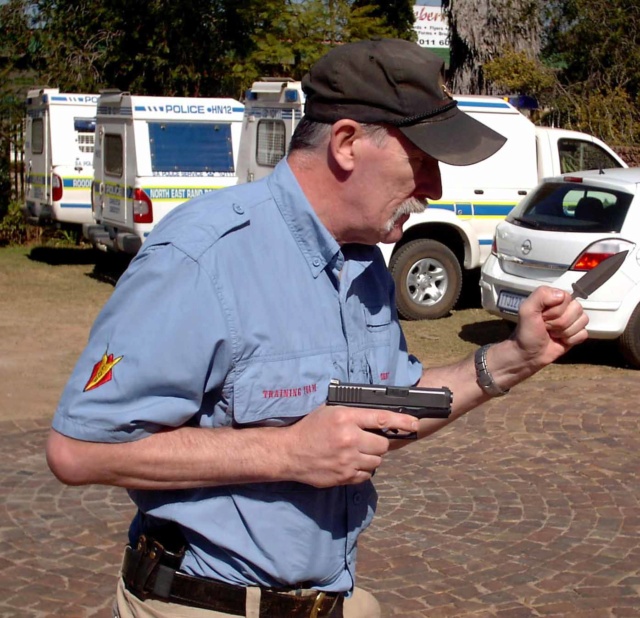 [The use of the knife to support the pistol in close-quarter situations is popular within South African Police units]SIZE ECOMONOCAL
[The use of the knife to support the pistol in close-quarter situations is popular within South African Police units]SIZE ECOMONOCALFor the same length blade, the PD handle is significantly shorter, thus allowing more discretion and comfort when carrying in a belt sheath.
 [Push dagger compared to Kasper Fighter. Same length blade, different overall length]DISADVANTAGES
[Push dagger compared to Kasper Fighter. Same length blade, different overall length]DISADVANTAGESWhen I first started seriously working with the Push-dagger, and exploring it’s benefits I was rather surprised that it wasn’t more popular in mainstream edged weapon training. I found there were two main reasons.
LEGALITIESThe Push-dagger is illegal in many jurisdictions. Several US States have statutes either specifically proscribing “push daggers”, or, banning daggers of any kind. In many places you can obtain a licence for a handgun, but carrying a PD would be a crime. In the UK it is now illegal to import, or, trade Push-daggers. So, the weapon suffers from it’s association with gamblers and similar shady characters in the past.
This means that the public perception of the PD is generally negative. Defending yourself with a PD, then explaining your actions to law-enforcement and a jury, is a tricky task.
LIMITEDI believe that many knife enthusiasts disregard the PD because it is limited. You can only thrust with it, and possibly perform a couple of slashes. No twirling, flourishes or snappy moves. To me, this is actually and advantage. Like a shark it doesn’t do much, but what is does, it does perfectly.
FAVOURITE KNIVES Fred Perrin adds a dash of Gallic elegance to his designs. His push dagger is a work of art, yet still a practical self-protection tool
Fred Perrin adds a dash of Gallic elegance to his designs. His push dagger is a work of art, yet still a practical self-protection tool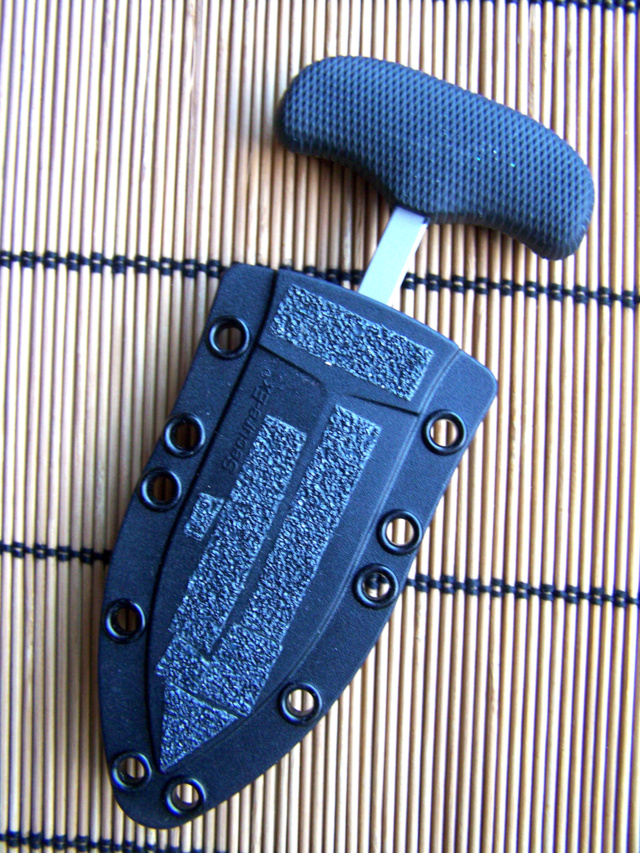 [The Cold Steel Safekeeper II Push Dagger is an ideal, inexpensive, EDC option. I’ve added some gripper tape to the sheath to aid stability and security within the waistband ]
[The Cold Steel Safekeeper II Push Dagger is an ideal, inexpensive, EDC option. I’ve added some gripper tape to the sheath to aid stability and security within the waistband ] [The CS Safekeeper-2 set up for leftside carry. Note the shock-cord is securing a flashlight within the waistband]
[The CS Safekeeper-2 set up for leftside carry. Note the shock-cord is securing a flashlight within the waistband]Cold Steel also offer an even cheaper option, with this plastic push dagger. You can buy several and secrete them throughout the house, down cushions, under matresses, between books on a shelf, or, within a vehicle.
 TRAINER
TRAINERFor realistic training with a live assailant a safe training knife is essential. This PD trainer can be used for many training situations.
 CURRENT SCENE
CURRENT SCENEA disparate group of cognoscenti have re-discovered the Push dagger. Realising that doing the aggressive Combative strikes with a blade in the hand is a great addition to the personal protection toolbox, they are keeping alive one of the most practical edged weapons ever developed.
The photo sequences show some the ways we can use the Push-dagger.
SEQUENCE ONE: Face off…
Face off… 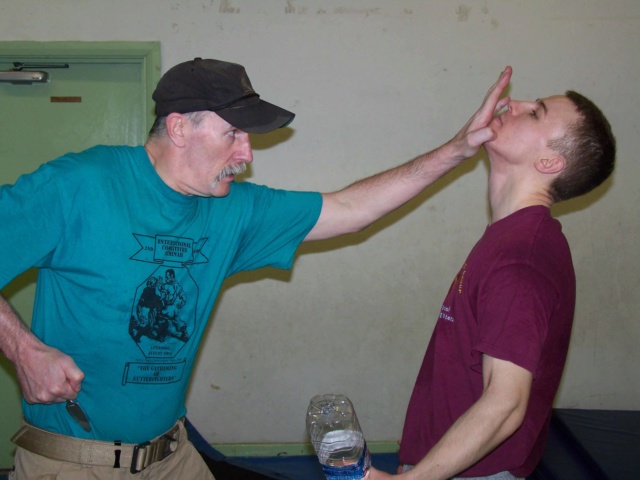 Strike to face as you access the dagger…
Strike to face as you access the dagger…  Stab to bladder, dropping your weight…
Stab to bladder, dropping your weight…  Grab the head as you rip the blade free….
Grab the head as you rip the blade free….  … into an uppercut under the jaw.
… into an uppercut under the jaw. [Uppercut stab close-up detail]
[Uppercut stab close-up detail]***
SEQUENCE TWO Face off….
Face off….  Slap to groin as you access knife….
Slap to groin as you access knife…. 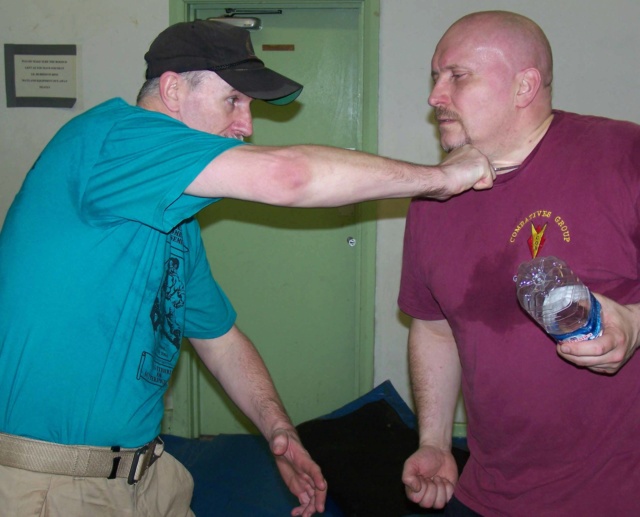
 Stab to throat.
Stab to throat.  [Detail of throat stab]
[Detail of throat stab]Thanks to Larry and Brian of the Liverpool Gutterfighters for help with the photo sequences.
UPDATESince the photos were taken I have obtained a new Push Dagger trainer from Nok.

Shown on the right in the photo, is is ideal for hard, but safe, contact training. Contact Nok by email
amok_nok@hotmail.comWebsite is
Nok Hard Training KnivesAlso shown is the PD sheath from MDTS. This can be setup for oblique draw....
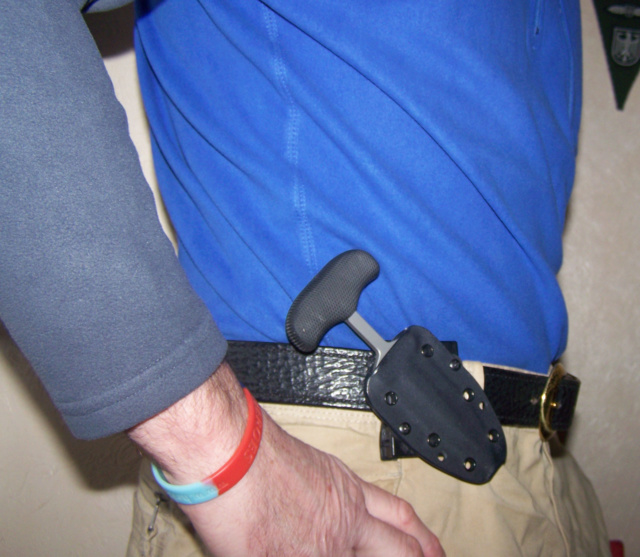
or, for horizontal access.....
 SOE CLANDESTINEWEAPON
SOE CLANDESTINEWEAPONWhile teaching in Scandinavia I was shown this rare and fascinating weapon.

A spike concealed within a razor turns it into a Push Dagger.....
This item is from the collection of Kurt Johanesson, whose collection of WW-2 covert weapons is unsurpassed.
++++++++++++++++++
FRED PERRINA recent addition to my collection comes through the kindness of Nick Engelen, who presented me with this Perrin masterpiece:
 The sheath allows either neck carry, or in a “ripcord” mode from within the waistband ….
The sheath allows either neck carry, or in a “ripcord” mode from within the waistband ….
As with all Perrin designs, the knife is wickedly sharp

Although the Push Dagger is primarily a stabbing weapon, the slash is still an option. The CS Safekeeper has cutting edges, and the Perrin design is especially suited to both edgework and stabbing.
With the PD the slash is mainly a "barrier removal" technique, to allow a clear path for the thrust.
 [Here the guarding arm is being slashed prior to a thrust to the chest]
[Here the guarding arm is being slashed prior to a thrust to the chest]Perrin knives available
here++++++++
While over in America recently, I was able to checkout a handy little dagger dubbed "The Puncher" from John McPhee, the famed Sheriff of Baghdad:
Details
here+++++++++++++++++++++++++++++++++++++++
All photographs copyright :copyright: Dennis Martin and must not be reproduced without specific permission[/i]
